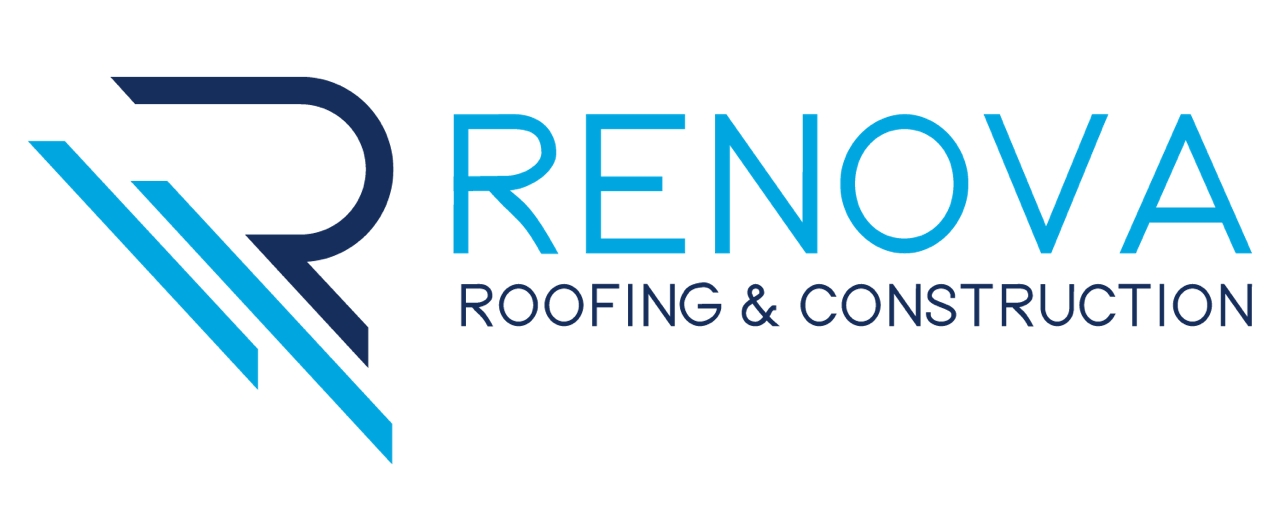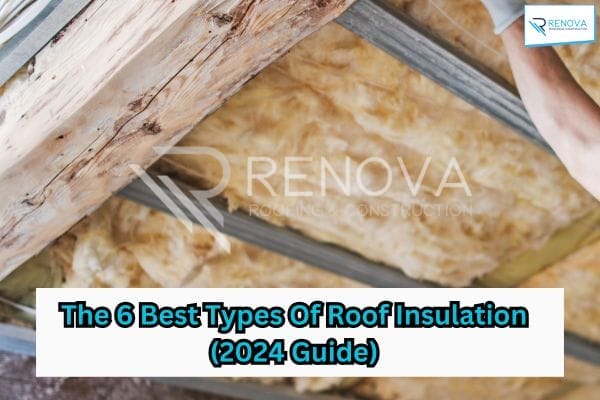Roof insulation is crucial for a comfortable home and lower energy bills. With constantly rising energy costs and environmental concerns, having the right type of roof insulation is a wise investment for any homeowner. Good insulation saves energy and money, making your home more comfortable all year round. In this blog post, we will briefly discuss different types of roof insulation, cost considerations, drawbacks, and more. Keep reading to find the right insulation for your home.
Things To Know About Roof Insulation
When looking for the right insulation for your home, there are some terms you may want to be aware of.
R-Value:
The R-value of roof insulation measures how well insulation resists heat transfer, and is what ultimately prevents heat from entering and escaping your home. When it comes to finding the right insulation for your home, the more resistance to heat transfer you want, the higher the R-value you need.
Moisture Resistance:
This is the ability of insulation material to resist moisture absorption and is an important characteristic, especially in areas such as Alabama and Mississippi, where moisture levels are high, or where there is a risk of water intrusion.
Also Read: Is Your Roof Insulation Inadequate? Tips For Detection And Ways To Solve It
#1 Fiberglass Batt Insulation

R-Value: R-2.9 to R-3.8 per inch
Fiberglass batt insulation is made from recycled glass materials. The process involves melting the glass and spinning it into lengthy fibers, which are then bonded together using a unique adhesive.
This type of roof insulation, available in batt and roll form, is an economically efficient option, costing approximately $.30 to $1.50 per square foot. It is ideally suited for filling the gaps between wall frames, ceilings, and floors, thanks to its excellent thermal resistance and soundproofing capabilities. Additionally, its fire-resistant properties significantly contribute to home safety, offering peace of mind to homeowners. Beyond its functional benefits, this insulation is environmentally friendly and easily recyclable, making it a sustainable choice for those looking to meet their insulation needs while minimizing their ecological footprint.
One significant drawback of this insulation is that it can cause irritation to your eyes, skin, nose, throat, and lungs. For this reason, it is recommended that you call a roofing contractor for installation. If you go the DIY route (not recommended), then make sure to wear disposable coveralls and the proper face protection to protect yourself from stray fiberglass particles.
#2 Spray Foam Insulation
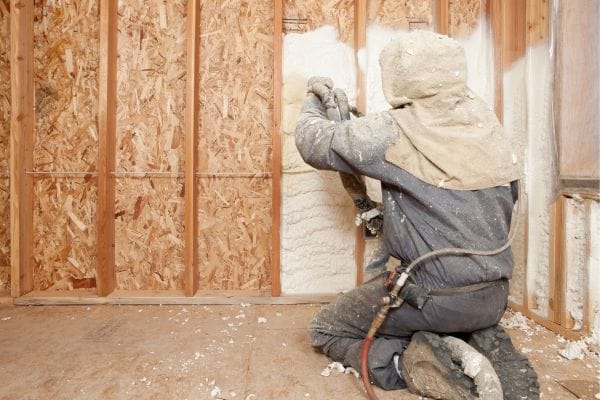
R-Value: R-3.6 to R-3.9 per inch
Spray foam insulation is created by combining two chemicals, isocyanate and polyol resin (both parts of a polyurethane structure). When these chemicals are combined, they react to create a foam that expands upon application, filling even the smallest spaces.
There are two types of spray foam insulation to choose from: closed-cell and open-cell. Closed-cell foam is denser and has higher R-values, providing better thermal resistance. On the other hand, open-cell foam is more flexible and less dense.
While spray foam insulation offers excellent thermal performance, it costs about twice as much as traditional fiberglass batts. However, the higher upfront cost can be balanced by the long-term energy savings and improved comfort provided by spray foam insulation. Ultimately, choosing between closed-cell and open-cell spray foam depends on your specific insulation needs and budget.
#3 Loose Fill Insulation
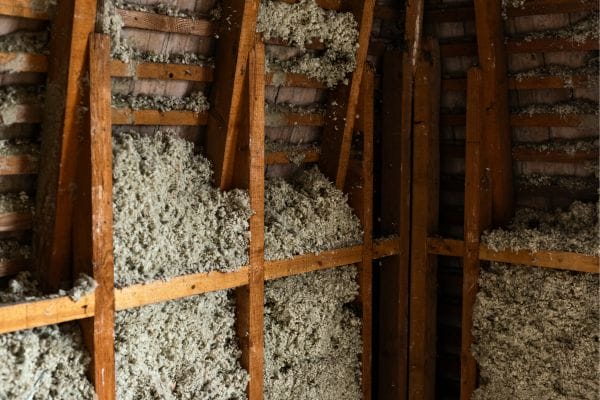
R-Value: R 2.2 to R 4.3 per inch
Loose-fill insulation is made of materials like fiberglass, cellulose, or mineral wool. It fills up gaps and spaces in walls and attics to stop heat from escaping. Because it can fit into different-sized spaces easily, it’s handy for many parts of a building. It costs between $.25 to $2 per square foot, and even though it might cost more at first, it can save money in the long run by reducing energy bills.
#4 Mineral Wool Insulation
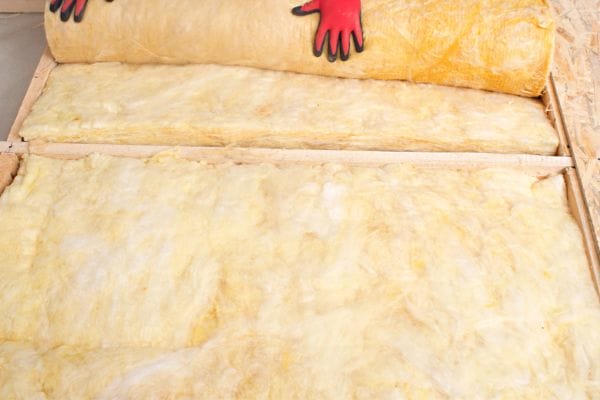
R-Value: R 3 to R 3.3 per inch
Mineral wool insulation, priced between $1 and $2.50 per square foot, is a popular choice for insulating buildings due to its effectiveness in retaining heat. It is made from natural or synthetic minerals, typically basalt or slag, which are melted and spun into fibers. These fibers create a dense and resilient insulation material that provides excellent thermal insulation properties.
However, it comes with some drawbacks, such as the fibers in mineral wool irritating skin upon contact. Another downside is that mineral wool is not biodegradable, posing environmental concerns regarding disposal. Despite these drawbacks, its affordability and powerful insulation properties continue to make mineral wool a favored option for homeowners and builders seeking efficient insulation solutions.
#5 Polyiso insulation
R-Value: R 6.5 per inch
Polyiso insulation is a high-performance roof insulation composed of closed-cell polyisocyanurate foam, allowing it to offer superior insulation compared to traditional materials. Its closed-cell structure provides excellent resistance to moisture, making it ideal for areas prone to dampness. Additionally, polyiso insulation boasts a high R-value per inch, allowing for thinner insulation layers while maintaining effectiveness. This feature is particularly beneficial in space-restricted applications. While polyiso insulation tends to be pricier upfront, it still remains a cost-effective choice for both residential and commercial projects seeking top-notch insulation solutions.
#6 Expanded Polystyrene (EPS) Insulation
R-Value: R-3.9 to R-4.4 per inch
Expanded polystyrene (EPS) insulation is another variant of rigid board insulation made from a chemical called styrene, which is transformed into solid beads and then expanded to create foam material. This lightweight and rigid foam material is widely used in the construction and packaging industries.
The polystyrene beads consist of approximately 98% air, making the insulation boards exceptionally lightweight. EPS insulation is recyclable, contributing to its eco-friendliness. This insulation can also be modified with additives such as flame retardants to enhance fire resistance properties, making it a versatile choice. It can cost around $.40 to $.75 per square foot.
Also Read: Reasons Why Garage Roof Insulation Is A Good Investment
Best Insulation Protectors To Use In 2024
Sometimes, cover boards can be used to protect insulation on flat roofs and enhance their thermal barrier. If you have a home with modern architecture and a flat roof, you may want to consider installing cover boards over your insulation material. However, pay particular attention to the type of insulation you’re installing it over, as different cover boards should not be paired with specific types of insulation.
Fiber Cement Cover Boards
R-Value: 2 to 3.5 per inch
Fiber cement cover boards are a type of composite material crafted from sand, cement, and cellulose fibers. These boards can be used alone or in combination with plywood for various construction projects and are renowned for their durability and strength, making them a top choice for roof insulation.
This material offers exceptional reinforcement, particularly suitable for residential homes. It’s highly accessible and boasts impressive resistance to weather, fire, mold, and pests, making it ideal for properties exposed to harsh conditions like coastal areas or regions prone to tornadoes or fires. However, fiber cement boards have drawbacks, including higher costs compared to alternative options and increased weight, which can complicate installation. You can expect to invest between $5 to $14 per square foot for fiber cement board installation.
Perlite Cover Boards
R-Value: 2.7 per inch
Perlite cover boards are among the oldest options available for insulating a roof. They are made from various materials, including perlite ore, cellulose fibers, asphalt, and binders. This form of cover board insulation is priced between $0.30 to $0.50 per square foot.
An advantage of perlite cover boards is their eco-friendly nature, often made from recycled materials. However, a significant drawback is their lack of moisture resistance, making them unsuitable for humid climates. Perlite cover boards are also prone to blistering and tearing.
Contact Renova Roofing & Construction For Your Roof Insulation Needs
Investing in quality roof insulation improves the performance and longevity of your building. That is why, when it comes to roof insulation, you need an experienced contractor for the installation. Luckily, our expert team at Renova Roofing & Construction offers top-notch residential roofing services around the Gulf Coast.
Contact us today at (601) 647-3433 for insulation that suits your needs with the utmost attention to detail.
Frequently Asked Questions (FAQs)
What is roof insulation?
Roof insulation is a vital component of energy-efficient homes. It is an additional layer that acts as a barrier, preventing heat loss in winter and heat gain in summer, reducing energy bills, and ensuring comfortable indoor temperatures throughout the year.
How Do You Insulate A Roof?
To insulate a roof, you can use materials like fiberglass, foam board, or cellulose materials. Insulation should be installed between rafters or on the attic floor, ensuring coverage without compressing the material. Ensure that you also seal gaps and cracks to prevent air leaks, enhancing energy efficiency and comfort. Since it’s not an easy process, hiring a contractor is advisable for a quality installation that provides you with all the benefits.
How Much Does Roof Insulation Cost?
The cost of roof insulation varies depending on factors like materials, size, and labor. On average, it can range from $1 to $11 per square foot, depending on the size of the attic and the cost of labor. Keep in mind that these prices are subject to change, and while they may seem high, investing in insulation pays off through energy savings and increased comfort.
